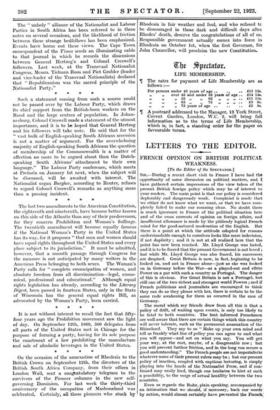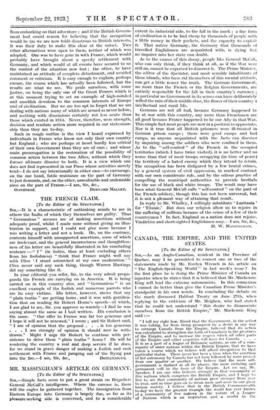LETTERS TO THE. EDITOR.
FRENCH OPINION ON BRITISH POLITICAL WEAKNESS.
[To the Editor of the SrEcrxron.] Sm,—During a recent short visit to France I have had the opportunity of some discussion on political matters, and I, have gathered certain impressions of the view taken of the. present British foreign policy which may be of interest to your readers. The main point is that our policy is considered deplorably and dangerously weak. Complaint is made that we either do not know what we want, or that we have com- pletely failed to make our meaning clear. No doubt there is much ignorance in France of the, political situation here and of the cross currents of opinion on foreign affairs, and insufficient allowance is made by the pitilessly logical French mind for the good-natured moderation of the English. But there is a point at which the attitude adopted for reasons understandable enough to ourselves looks like mere indecision, if not duplicity ; and it is not at all realized here that the point has now been reached. Mr. Lloyd. George was hated, and it is to be feared that the present Government is not loved ; but while Mr. Lloyd George was also feared, his successors, are despised. Great Britain is now, in fact, beginning to be looked on, and not in France alone—just as she was looked on in Germany before the War—as a played-out and effete Power on a par with such a country as Portugal. The danger of this is obvious. For Great Britain is not a Portugal, but still one of the two richest and strongest world Powers ; and if French politicians and journalists are encouraged to think they can do as they please with her, there is certain to be the same rude awakening for them as occurred in the case of Germany.
The moral which my friends draw from all this is that a
policy of drift, of waiting upon events, is only too likely to be fatal to both countries. The best informed Frenchmen are well aware that there are certain things which this country will never tolerate, such as the permanent annexation of the Rhineland. They say to us " Make up your own mind and tell us frankly what line of policy you can agree to and what you will oppose—and act on what you say. You will get your way, at the cost, maybe, of a disagreeable row ; but you will prevent further friction, and in the long run secure a good understanding." The French people are not imperialistic whatever some of their present rulers may be ; but ourpresent policy of inaction, coupled with captious lecturing, is simply playing into the hands of the Nationalist Press, and if con, tinued may easily lead, though one hesitates to hint at such a possibility, to the verge of actual hostility between the two countries.
Even as regards the Ruhr, plain speaking, accompanied by an intimation that we should, if necessary, back our words' by action, would almost certainly have prevented the Frew* from embarking on that adventure ; and if the British Govern- ment had sound reason for believing that the occupation would be (as we are now told) disastrous to British interests, it was their duty to make this clear at the outset. Two other alternatives were open to them, neither of which was adopted. One was to have gone in with France, which would probably have brought about a speedy settlement with Germany, and which would at all events have secured to us the control of the situation now lost ; the other, to have maintained an attitude of complete detachment, and avoided comment or criticism. It is easy enough to explain, perhaps excuse, the course which has actually been followed, but the results are what we see. We pride ourselves, with some justice, on being the only one of the Great Powers which is at this moment trying to set an example of high-minded and unselfish devotion to the common interests of Europe and of civilization. But we are too apt to forget that we are dealing with nations many of which are armed as never before, and seething with dissensions certainly not less acute than those which existed in 1914. Never, therefore, were strength, decision and resolute action more required in our statesman- ship than they are to-day.
Such in rough outline is the view I heard expressed by individuals in France who know not only their own country but England ; who are perhaps at heart hardly less critical of their own Government than they are of ours ; and whose main preoccupation is the restoration of the possibility of common action between the two Allies, without which they foresee ultimate disaster to both. It is a view which one does not find represented in our Press whose activities merely tend—I do not say intentionally in either case—to encourage, on the one hand, futile resistance on the part of Germany to just demands, and, on the other, unrealizable and undeniable aims on the part of France.—I am, Sir, &c.,







































 Previous page
Previous page